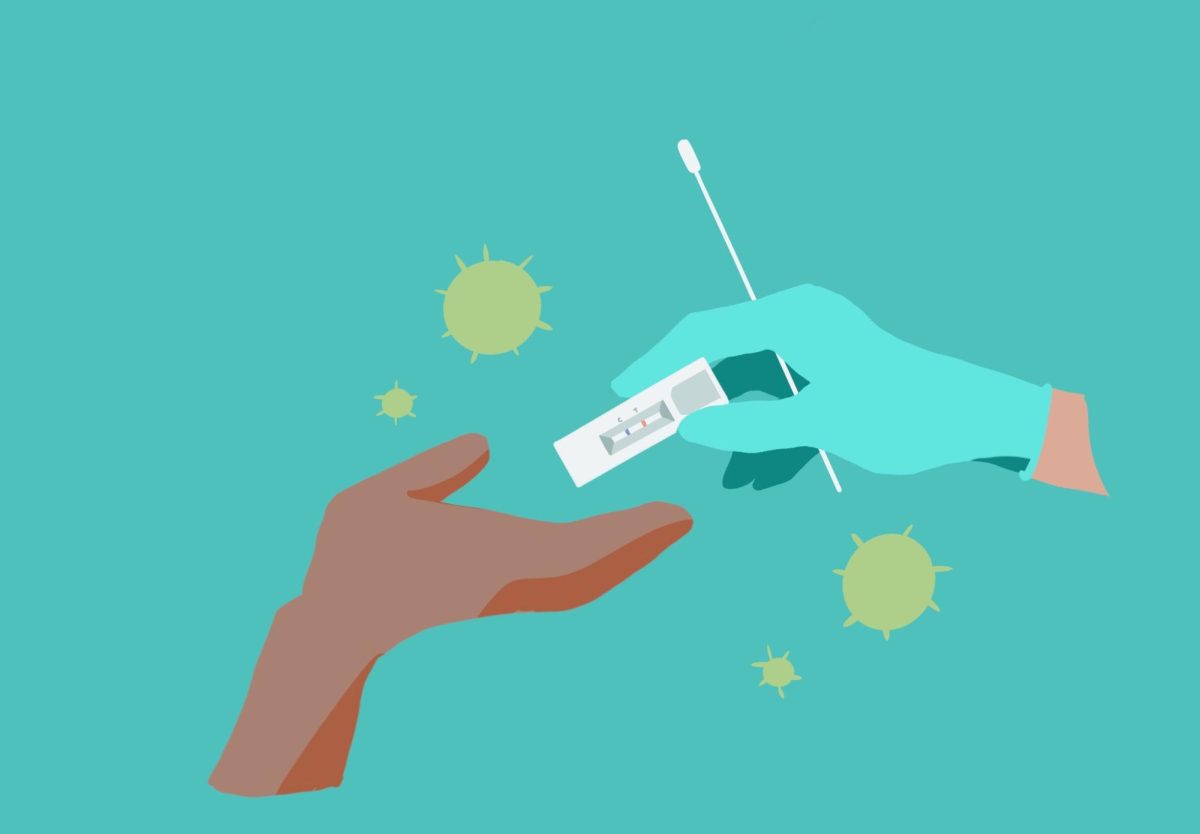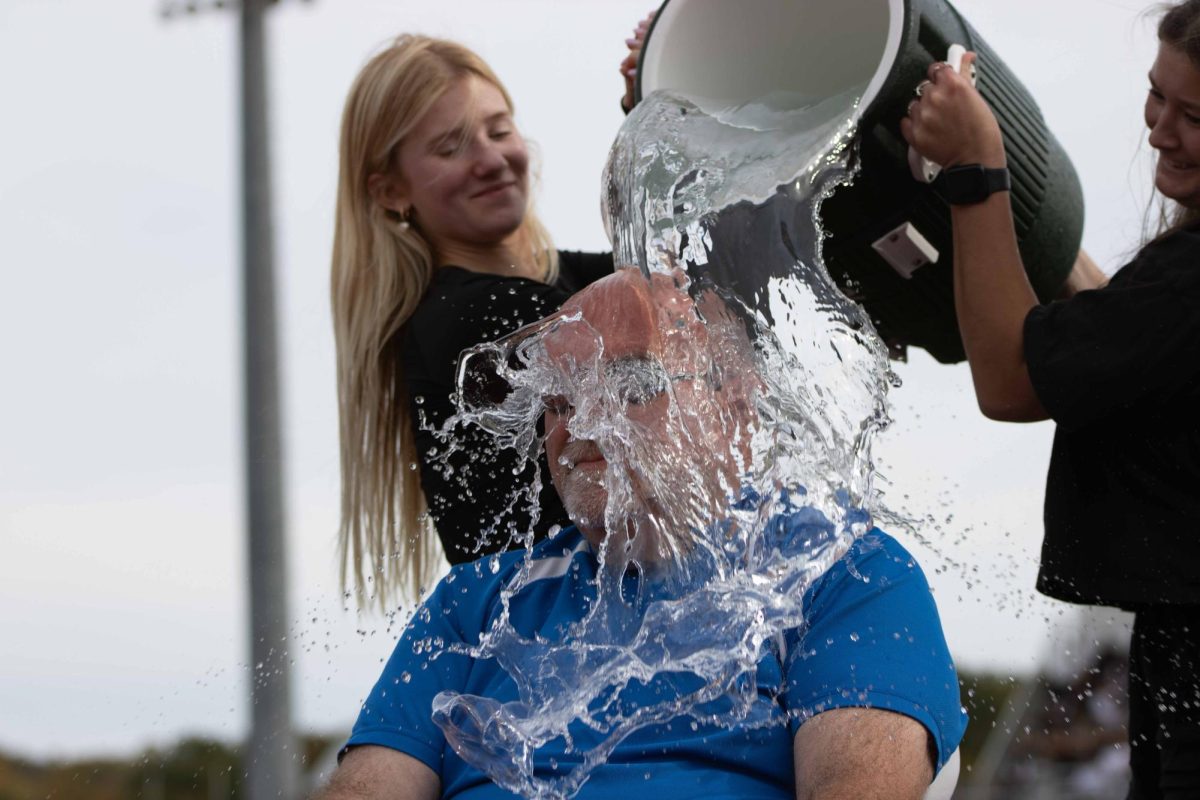The Michigan Department of Health and Human Services (MDHHS) announced a partnership with the Rockefeller Foundation to expand access to free COVID-19 tests for Michiganders in a press release on Sep. 30, 2023.
According to the press release, “All households in the state of Michigan can order their free COVID-19 tests through AccessCovidTests.org. Each household will receive one kit with five tests, typically within a week of ordering. Individuals without internet access can contact 211 for assistance ordering tests. “
MDHHS has partnered with Michigan libraries, including the Ann Arbor District Libraries, to provide free at-home testing. Click here to see a list of participating libraries.
“The pandemic is not over,” said Huron High School nurse Ann Burdick. “It’s just becoming an endemic, not a pandemic.”
Burdick has served the Ann Arbor community since 2003. She encourages the school community to observe health procedures such as wearing masks and getting COVID-19 testing.
“A lot of kindness has come out — some people really get it,” Burdick said. “People will wear a mask or go the extra mile. We have a staff member whose husband is on chemo, but she doesn’t want to carry anything home.”
The Huron High School nursing office offers limited COVID-19 rapid testing kits for sick students to take home. The nursing office can only administer COVID-19 testing with parental approval.
The MDHHS stresses the importance of testing in managing the COVID-19 endemic.
“Testing remains a critical tool in managing the spread of COVID-19 and reduces the risk of spreading the virus to our loved ones and neighbors. We encourage residents to take advantage of these free tests as we head into the fall season when respiratory diseases, like COVID-19, spread most easily,” said Dr. Natasha Bagdasarian, chief medical executive, in the MDHHS press release.
The COVID-19 pandemic exposed existing disparities in health and health care, according to MDHHS Public Information Officer Lynn Sutfin.
“Early on in the pandemic, it became clear some communities were far more impacted by COVID–19 than others,” Sutfin said in an email interview. “The pandemic brought into sharp focus previously existing disparities in health and health care, with people of color, particularly Black and African American people, bearing the heaviest burden of negative impacts on health and well-being, as well as socioeconomic impacts.”
The COVID-19 pandemic led to the establishment of the Michigan COVID-19 Racial Disparities Task Force in April 2020. The task force connected leaders from government, academia, health care, economics, public health, epidemiology, education, the private sector, and other disciplines.
“The creation of this Task Force and the recommendations made by this diverse group continue to be instrumental in the work we do and have informed many of the outreach efforts conducted by the state and our public health partners,” Sutfin said. “We continue to address equity and social determinants of health across the state based on these recommendations designed to remove barriers to health care; reduce the impact of racial bias in medical testing and treatment; and develop and improve systems to support long-term economic recovery and physical and mental health care for all Michiganders.”
Looking back, Burdick also observed how the COVID-19 pandemic revealed existing flaws in the healthcare system.
“People’s emotions were raw,” Burdick said. “COVID-19 put a blip in everything. Lots of healthcare providers retired, and hiring nurses has been a problem.”
She added that the “fatigue and lack of real support” contributed to the strain on healthcare providers.
“I had one nurse — her husband got COVID-19 — and it was hard for him because they still wanted him to see patients virtually,” Burdick said.
She recommends the Washtenaw Health Department website and weekly emails as a health resource. See the Washtenaw Health Department website here.
“Before I was a school nurse, I didn’t realize how much [the Washtenaw Health Department] does for our community,” Burdick said. “They put out this weekly email where you can order tests to be mailed to you.”
She remains optimistic about navigating the COVID-19 endemic.
“We are our brothers’ keepers,” Burdick said. “The changes you will go through in your lifetime astounds me — power to you — you guys are growing up in this COVID-19 experience. You have to roll with the punches. You have to overcome and look at things differently.”
MDHHS encourages Michigan families to check with their providers about updates on insurance coverage.
According to the Michigan Department of Insurance and Financial Services website, “Federal law required that many health services related to COVID-19, including testing, had to be covered at no cost for the duration of the COVID-19 Public Health Emergency (PHE). Now that the PHE has ended, there may be changes to health insurance coverage for COVID-related testing.” Click here for more information on the coverage of COVID-19 tests.
“We are now living with COVID-19 like we do with many other respiratory viruses,” Sutfin said. “MDHHS will continue to monitor how the virus is affecting our state to dial up countermeasures when needed and then dial down as the situation improves. This could include guidance on masking and social distancing or increased testing and vaccination sites. We continue to urge all Michiganders to get their COVID-19 vaccine as this is our best defense against the virus.”
Michiganders can access information regarding COVID-19 vaccines on the MDHHS website here. According to the Center for Disease Control and Prevention (CDC) website, “COVID-19 vaccines help our bodies develop immunity to the virus that causes COVID-19 without us having to get the illness.” The CDC clarifies that “COVID-19 vaccines do not use any live virus and cannot cause infection with the virus that causes COVID-19 or other viruses.” The CDC recommends that “everyone aged 5 years and older get one dose of an updated COVID-19 vaccine to prevent serious illness from COVID-19.” The 2023-2024 updated COVID-19 vaccines include Pfizer-BioNTech, Moderna, or Novavax. See the CDC website here for more details on COVID-19 vaccines.
MDHHS encourages Michigan families to contact healthcare providers for specific recommendations and to decide on a COVID-19 plan that works for them. Suggestions include keeping over-the-counter tests and masks at home, getting updated on COVID-19 vaccines, and contacting a healthcare provider about eligibility for therapeutics that reduce the risk of severe COVID-19 disease for those who test positive.
Families can visit websites like Michigan.gov/coronavirus and CDC.gov/coronavirus to stay informed on timely and accurate information about the COVID-19 endemic.










